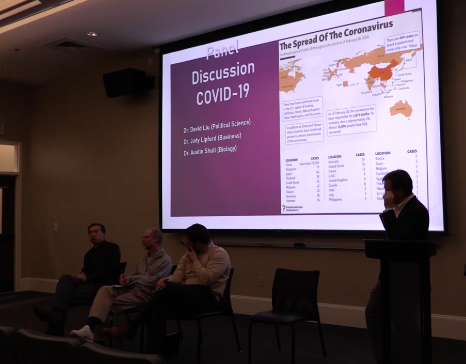Should PC be worried about the Coronavirus?

March 2, 2020
On Wednesday, Feb. 19, a Panel Discussion was held in Neville Kuhne Auditorium to provide students with information about the coronavirus and give them a chance to ask professors questions about the virus’ implications.
Dr. Stefan Wiecki, an Associate Professor of History, was the first person to speak at the Panel. Dr. Wiecki was the mediator for the discussion and he introduced the topic of the coronavirus to the audience.
The coronavirus disease currently circulating around the world is one of seven different kinds of coronaviruses known to infect humans. Four coronaviruses cause common cold, the fifth virus is called Severe Acute Respiratory Syndrome (2003) and the sixth virus is Middle East Respiratory Syndrome (2012). The final coronavirus is CoViD-19 (2019), which is the novel virus that just recently arose.
The coronavirus is thought to have originated in bats and was then mutated and passed to humans through an intermediate animal, such as a pangolin or another wild animal sold in a Chinese wet market.
The coronavirus seems to spread before symptoms appear. The virus can be transmitted through touching contaminated surfaces, and there is a possibility it could be transmitted through the air, which could increase exposure and the likelihood of infection. The current symptoms include cough, fever, shortness of breath, stuffy nose, nausea, fatigue and vomiting.
One of the issues with CoViD-19 is that the lethality of the disease cannot be accurately determined right now because predictions are difficult to calculate since the disease is in its early stages. The current death rate is roughly 2%, which is twenty times more lethal than the regular flu. In severe cases, the coronavirus can develop into pneumonia, respiratory failure, septic shock or multiorgan failure.
To prevent infection of the coronavirus, avoid contact with others who are sick, wash hands with soap or water for at least 20 seconds, avoid touching your face and wear a mask for protection.
The first panelist to speak was Dr. David Liu, a native of China with a PhD in Political Science. Dr. Liu informed the audience that a Chinese doctor first discovered the coronavirus and disseminated the discovery over a popular Chinese social media platform on Dec. 30, 2019. The message was not disseminated by the government until Jan. 12, 2020. The doctor later died from the coronavirus.
There are a large number of Chinese people under quarantine in order to protect the population of China from being infected by the coronavirus.
The coronavirus exposed the top down system of the Chinese government in which it is hard to maintain local accountability because they have to answer to those in political power. At the national level, there are approximately 760 million people currently under lock down in China. Additionally, there are many medical professionals at risk of exposure to the coronavirus. Unfortunately, China’s transparency of the coronavirus disease created xenophobia from other countries.
There are over 2,000 deaths currently and around 75,000 are confirmed to be diseased.
The second panelist was Dr. Jody Lipford, a Professor of Economics and Business Administration with specialties in public finance, public choice and property rights. Dr. Lipford focused his discussion on the economic implications considering that China is a major supplier for many countries, especially the United States.
Suspended retail, travel and supply chains are the greatest economic concerns for the US. Gross Domestic Product (GDP) is the value of everything produced in an economy within a year. The current estimate is that the GDP of the US will be affected by China’s lock down by 0.5% in the first quarter of the year, which is about 25 billion dollars.
The third panelist was Dr. Austin Shull, a Professor in the Biology Department and the Health Science Advising Chair. Dr. Shull began by explaining that the “R Naught” value is the expected number of individuals a diseased person can infect. The coronavirus is an RNA virus that can cause immediate damage and a sudden onset of symptoms.
Science has improved remarkably at quickly producing vaccines, but an issue is the availability of mass communication that can spread news quickly and cause panic. It is important to recognize what medical scientists are able to accomplish with the development of vaccines and their purpose of protecting individuals from very dangerous diseases.
Overall, the coronavirus is such a newly developed disease that the US, along with other countries around the world, are still trying to understand what effects it will have on citizens economically, socially and scientifically. There are some instances in which the disease can be a silent virus, where symptoms are not obvious to the infected person. Problems like the silent virus inhibit the accuracy of the estimates available to scientists and prolong the development of a vaccine.
Will the coronavirus affect PC? We aren’t sure. Because of the limited knowledge about the coronavirus and how it spreads, there is no way to know where the virus may be around us. The best way to prevent infection is to follow the protocols listed above and remember to wash your hands!
Another important thing to remember is that one of the biggest issues surrounding the coronavirus is the fear associated with those infected and those who live in China, where the virus is thought to have originated. This is most likely not the last virus to arise on a widespread scale, and we should be focused on attending to those infected and researching cures rather than placing blame or judgement on others.
If you would like to listen to the full Panel Discussion, here is the link to the video Dr. Wiecki recorded: https://www.youtube.com/watch?v=-IuMbfrBaus&feature=youtu.be




